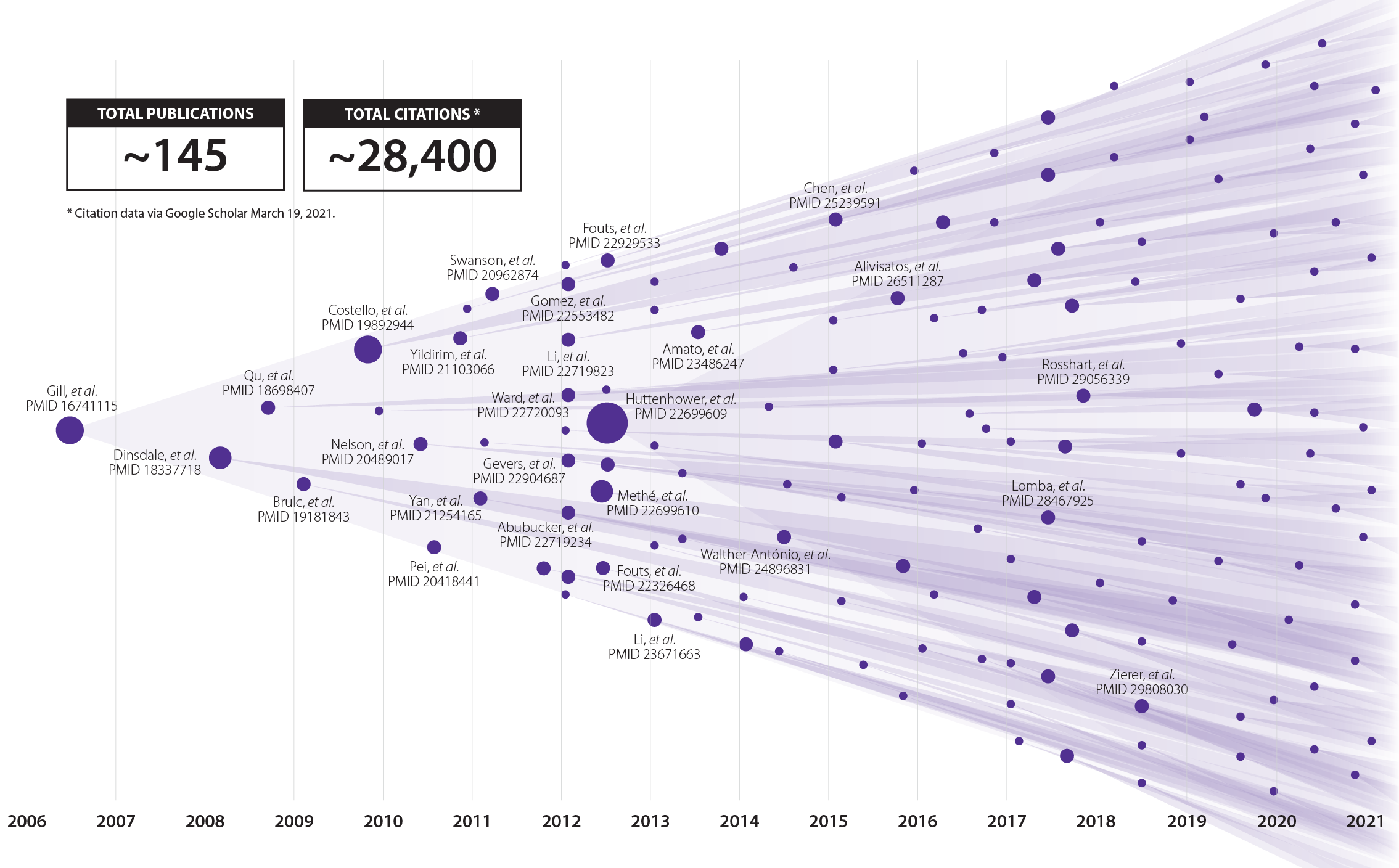Human Microbiome
Both inside and out, our bodies harbor a huge array of bacteria and other microorganisms collectively known as the human microbiome. Although bacteria are often thought to be dangerous, many of those that comprise the microbiome are essential for life. Our researchers are focused on understanding the delicate bacterial balance in the human body and how slight changes in that balance can either improve health or lead to diseases.
JCVI Human Microbiome Research Impact

Inflammation: Friend or Foe?
JCVI Associate Professor, Marcelo Freire, DDS, PhD, DMSc, continues to lead the field as he investigates the critical role the human microbiome plays in inflammation as the pathway to chronic disease.
Astronaut Microbiome
This project aims to understand how the extreme conditions of space travel affect the microbiome.
Help Take the Bite Out of Cancer
The goal is to find novel biomarkers to aid in prevention, diagnostics, and therapeutics of OSCC.
Saliva Proteome Database
The Human Salivary Proteome (HSP) Wiki as a public data portal for searching and retrieving custom-curated information about the proteome of human saliva.Leonardo da Vinci DNA Project
This project utilizes genomics approaches to confirm the identity of the remains purported to be that of Leonardo da Vinci as well as to characterize the microbial population on aging artwork.
Genomics, Biomarkers and Mechanisms of Healing in Chronic Wounds
Utilize genomics approaches to identify the microbial composition and functional elements in non-healing and chronic wounds.
Proteomics for UTI diagnosis
Understanding host-pathogen interactions is critical when it comes to improving diagnostic approaches to urinary tract infections.
Genomics and Proteomics Approaches to T1D
This study addresses the complex interactions between the host and environmental factors as they relate to the development of Type I Diabetes (T1D).
Human Microbiome Project
The Human Microbiome Project involves characterizing human microbial isolates using whole genome shotgun sequencing.
Asymptomatic Bacteriuria: Microbiome and Metaproteome
We use genomics approaches to detect the presence of bacteria with known inflammatory responses in asymptomatic patients.
Statement on cuts to National Institutes of Health funding
Disruptions or reductions in funding may irreparably harm biomedical research efforts at J. Craig Venter Institute and in the broader research ecosystem
Tae Seok Moon, Ph.D. and Nan Zhu, Ph.D. join J. Craig Venter Institute faculty
JCVI continues to actively recruit faculty to expand core research areas, including human health and synthetic biology
Groundbreaking study reveals oral microbiome’s role in immune response and COVID-19 severity
Newly developed AI model shows that saliva is a better predictor of COVID-19 severity than existing blood tests
New LongCOVID research launched by PolyBio’s global consortium of scientists
Funding will deepen research on the persistence of the SARS-CoV-2 virus in LongCOVID patients and launch new clinical trials
JCVI Associate Professor Marcelo Freire elected to the 2022 class of AAAS Fellows
Biology in Art: Genetic Detectives ID Microbes Suspected of Slowly Ruining Humanity’s Treasures
DNA science may help restore, preserve historic works, unmask counterfeits
The trait elite baseball hitters share with Leonardo da Vinci: A “quick eye” with higher “frames per second.” A function of training, genetics, or both?
Maintaining a Healthy Upper Respiratory Tract Microbiome May Help Prevent Secondary Infections in Influenza A Patients
An influenza-impacted upper respiratory tract microbiome may invite opportunistic bacterial pathogens
JCVI/AADR Fall Focused Symposium
Integrating Omic Datasets Towards Translation
When Starved, Dangerous Oral Bacteria Hang On
J. Craig Venter Institute Makes Strides in Microbial Analysis of Artwork which May Lead to Better Preservation Techniques
BioVision Alexandria 2018
Investigating membrane alterations as a mechanism of acid tolerance in caries-causing bacteria
The role of the oral microbiome and protection from acid damageIdentifying Healthy Aging Biomarkers
This study aims to identify specific biomarkers that correlate with longevity and healthy aging using genomics and proteomics approaches.
Zoo in You Traveling Exhibition
Our bodies are home to trillions of bacteria. This project provides an education resource to middle and high school aged children who are interested in science and medicine.
TEDDY Infectious Agents
In this study, we propose to investigate the Prokaryotic species associated with the gut microbiome using whole genome shotgun metagenomic sequencing of stool samples via Solexa sequencing technology.
Vaginal Microbiome Project
A metagenomics approach to understanding the relationship between the vaginal microbiome, bacterial vaginosis, vaginal health and preterm birth.